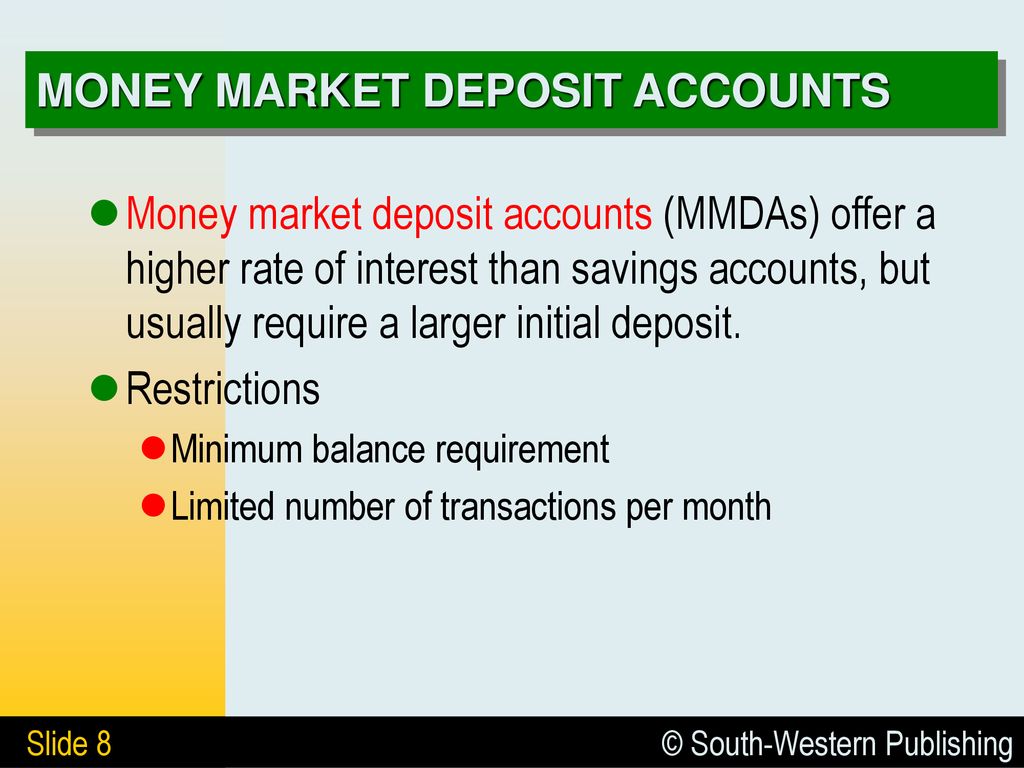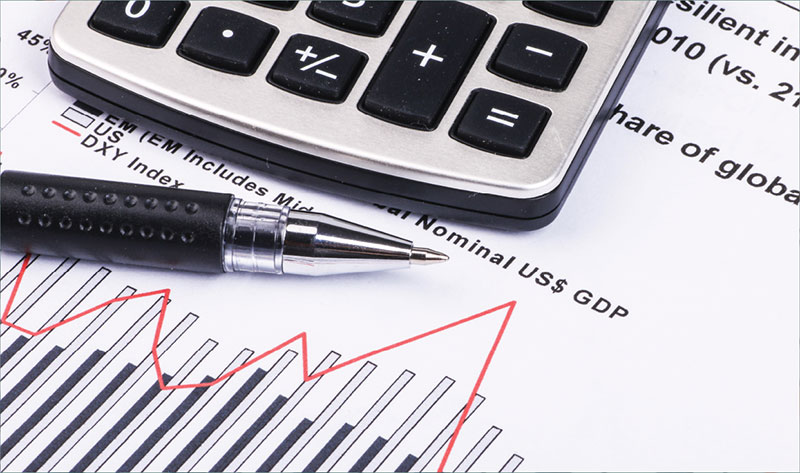Money Market Deposit Account
A money market deposit account is a type of savings account which is designed to be highly liquid. Depositing funds in such an account allows people to create a savings account which earns interest and is very low risk, as funds deposited in money market accounts are insured by the government. Many banks and investment firms offer money market deposit accounts to their customers, with interest rates which can vary, depending on the institution and the current economic conditions.
- Money Market Deposit Account Definition
- Money Market Deposit Accounts Are A Type Of Checking And Investment Account
- Compare Money Market Interest Rates
Open a savings account or open a Certificate of Deposit (see interest rates) and start saving your money. Prepaid Card The Starbucks ® Rewards Visa ® Prepaid Card is the only reloadable prepaid card that allows you to earn Stars everywhere you shop, with no monthly, annual or reload fees. A money market account, or money market deposit account, is a government-insured bank account that pays relatively high interest rates and provides cash withdrawal privileges.
Money market account: Money market accounts are similar to savings accounts, but they require you to maintain a higher balance to avoid a monthly service fee. Where savings accounts usually have a fixed interest rate, these accounts have rates that vary regularly based on money markets.
Several restrictions are usually placed on a money market account. Most have a high minimum deposit requirement which is intended to ensure that depositors deposit enough funds to make the maintenance of the account profitable for the bank. There may also be transaction limits on the account which are part of the financial regulations which distinguish between checking and savings accounts. However, customers can usually draw checks on a money market deposit account, and use the account much like they would use a regular checking account.
The interest rate on a money market deposit account is higher than that for conventional savings and checking accounts, but it is lower than many other types of investment accounts. People may choose this investment option because they want security and flexibility, and are willing to sacrifice some interest earnings to achieve these goals. A riskier option is a money market fund, in which a fund sells shares which are used to buy securities, with the profit from the securities being distributed to shareholders. Money market funds are not insured by the government, making them a more dangerous investment.
Money Market Deposit Account Definition
When looking at the money market deposit accounts offered by various financial institutions, there are several things to take into consideration. Investors should definitely compare interest rates and find out whether the rates are fixed or fluctuating, and how long the interest rates will be guaranteed. They should also familiarize themselves with the minimum deposit requirements, the fees which may be charged if the balance dips below those requirements, and the transaction restrictions placed on the account.
A great use for a money market deposit account is as a holding place for funds recently realized from the sale of investments or the settlement of an estate. The funds will earn some money in the money market account, but they will also be very easy to access if necessary, and they are guaranteed by deposit insurance. For long term investments, other types of investment accounts can yield more income.
In this article:
Savings accounts, money market accounts and certificates of deposit (CDs) are all viable options for setting aside your money and watching it grow. These three kinds of accounts share similarities, but they work differently and may serve different purposes.
Savings accounts, money market accounts and CDs typically differ in terms of their interest rates, restrictions, benefits, fees and level of risk. Furthermore, a savings account or money market account may make sense for short-term savings, while a CD is better suited for longer-term savings needs.
Interest rates for deposit accounts can go up or down based on rate-setting actions taken by the Federal Reserve. As of January 2021, Federal Reserve interest rates are historically low due to economic conditions caused by the ongoing pandemic. While low rates could make savings accounts, money market accounts and CDs less attractive to some, they remain good options for short-term or easily accessible savings.
Here, we'll review the pros and cons of these three types of accounts, and equip you with the answers you need before setting up a savings account, money market account or CD.

Savings Accounts
A savings account at a bank, credit union or other financial institution gives you a place to park money you plan to use for short-term needs, such as paying for a wedding or making a car down payment, or establishing an emergency fund you can access easily.
Money deposited in a traditional savings account earns interest, but not much. As of January 2021, the average interest rate (known as annual percentage yield, or APY) for a U.S. savings account was only 0.05% for a balance below $100,000, according to the Federal Deposit Insurance Corp. (FDIC). A yield of 0.05% would earn you just $2.50 per year on a $5,000 balance.
A high-yield savings account, often provided by online banks, can deliver an APY that's higher than a traditional savings account. But if you open a high-yield savings account at an online bank, be sure you're comfortable with the possibility that you may lack easy access to branches or ATMs.
The FDIC insures savings up to $250,000 per account holder at federally insured banks. If a bank fails and your savings account has less than $250,000 in it, the FDIC guarantees your money will be protected. If the savings account is at a credit union, the National Credit Union Administration (NCUA) insures the money under the same guidelines.
Keep in mind that a savings account is restricted to six withdrawals per month—a limit not imposed on checking accounts. If you exceed the six-withdrawal threshold, your savings account may be switched to a checking account. After the coronavirus outbreak was declared a pandemic in March 2020, the Federal Reserve temporarily suspended the six-withdrawals-per-month limit.
What to Consider When Opening a Savings Account
Here are some questions to ask when you're looking for a place to open a savings account:
- Is a minimum deposit required? In many cases, a minimum deposit is not required. But if it is, it'll likely be $25 or $50.
- What is the APY? Before opening an account, check to see what the interest rate is, and whether the rate is fixed or variable.
- What are the fees? Investigate the types of fees you may be charged. You might, for instance, be charged an account maintenance fee if your balance dips below a certain amount.
- Can I use a mobile app? Financial institutions that offer a mobile app provide an easier way to manage your savings account.
- How quickly can I get my money? Consider how long it might take to obtain your money if you can't visit a branch or ATM.
Money Market Accounts
Money Market Deposit Accounts Are A Type Of Checking And Investment Account
As with a savings account, a money market account is insured by the FDIC or NCUA, and it has withdrawal limits.
However, a money market account generally offers a higher APY than a traditional savings account. That's because cash in a money market account is invested in the financial markets. As of January 2021, the average interest rate for a money market account was 0.07% for a balance below $100,000 (compared with 0.05% for a savings account).
Unlike a savings account, you may be able to write checks with a money market account.
What to Consider When Opening a Money Market Account
Questions to ask before you open a money market include:
- What is the minimum deposit? For a money market account, the minimum deposit may be higher than a savings account requires.
- What is the APY? While the interest rate for a money market account may be higher than it is for a traditional savings account, you'll still want to inquire about the APY.
- What are the fees? Look into what, if any, fees the financial institution charges. For example, you might have to pay for checks, and could be charged fees if your account balance is low. (The minimum required balance on a money market account is typically higher than with a savings account.)
- Is there a mobile app? Like with a savings account, having a mobile app you can use to conveniently check your balance and manage your money can be a big help.
- How accessible is my money? How long would it take to pull cash from your account? With a money market account, you can usually make withdrawals and write checks whenever you'd like, up to a certain number of transactions per month.
Certificates of Deposit
CDs, available from banks and credit unions, are deposit accounts like savings and money market accounts, but there are key differences. When you purchase a CD, a minimum deposit is required. Furthermore, you're not allowed to withdraw money from a CD before a certain period of time expires, such as six months or two years. Otherwise, you'll be hit with a financial penalty.
Another disadvantage: You can't use a check, ATM or electronic transfer to access your money.
That said, CDs typically provide higher interest rates than savings accounts and sometimes money market accounts. For instance, the average APY for a six-month CD with a balance below $100,000 was 0.10% as of January 21, 2021. The average APY for a 60-month CD was 0.32%. In most cases, the interest rate for a CD doesn't change while the account is open, which is a big perk if you open it before rates are cut.
Once the CD's term ends, you can withdraw the money or roll it over to a new CD.
The FDIC and NCUA insure CDs up to the same $250,000 limit (per institution and type of account) as savings and money market accounts.


What to Consider When Opening a CD
Things to look at before you open a CD include:
- The APY: Is it competitive with other financial institutions?
- The penalty for early withdrawal: You could lose money if you make a withdrawal before the CD reaches its 'maturity' date.
- The need to quickly access money in case of an emergency: If you're nervous about tying up money in a CD, this type of account might not be the best option.
How to Choose the Right Account for Your Needs
Savings account, money market account or CD—which one should you pick?
A savings account might be a good option if you have a relatively small amount of money and aren't itching to earn a more competitive interest rate. It also might be a smart choice when you want to be able to use an ATM card or electronic transfer to access your cash.
If you've got a bigger stash of cash and you want to be able to access it easily, a money market account may be the way to go. You typically earn a higher interest rate with a money market account compared with a savings account. But you may need to stay above minimum balance requirements to avoid fees. And, just as with a savings account, the number of withdrawals per month may be limited.
To earn a potentially higher interest rate than a savings or money market account, you might park your money in a CD. But unless you keep your money in a CD for the prescribed amount of time, such as six months or 60 months, you may face a financial penalty that could erase the interest you've collected.
Alternative Places to Grow Your Money
When you're selecting a spot to put your money—particularly for the long term—a savings account, money market account or CD may not be the right option. Fortunately, alternatives are available, including a 401(k), an individual retirement account (IRA) and individual stocks.
Compare Money Market Interest Rates
401(k)
A 401(k) is an employer-sponsored retirement account. It's an ideal vehicle for retirement savings, with income tax reductions and potential contribution matches from employers being among the benefits. The most common investment choice available through a 401(k) is a mutual fund. Investors own shares of a mutual fund, which pools money from many investors to purchase stocks, bonds and short-term debt.

Individual Retirement Account (IRA)
An IRA allows you to set aside money for retirement up to a certain annual amount, and doesn't require any involvement from your employer. Depending on the type of IRA you open at a financial institution, you can build retirement savings on a tax-free or tax-deferred basis. Investment options available through an IRA include stocks, bonds, CDs and exchange-traded funds (ETFs).
Individual Stocks
Individual stocks also are in the mix of places to put your money. When you buy a share of stock, you own a slice of a company. As with any type of investment, stocks come with risks and rewards—mainly gaining or losing your money depending on the rise and fall of stock prices.

The Bottom Line
You enjoy a wealth of options for saving your money, including savings accounts, money market accounts and CDs. When you weigh those three alternatives, keep in mind whether you'd need immediate access to your cash, how much interest you'll earn and what fees or penalties are involved. At the same time, take into account whether you need to create an emergency fund, pay off high-interest credit card debt or take care of other financial needs.